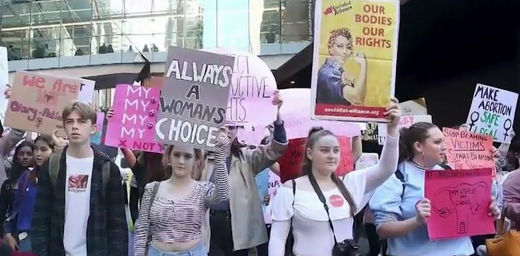Photos: YouTube
Washington, D.C. — Last week, the Center for American Progress released a report examining the economic consequences of state abortion bans. The report provides a comprehensive overview of the existing research that highlights the connection between abortion legalization under Roe v. Wade and women’s advancement, along with an analysis of the challenges women—especially women of color—will face in the 27 states that have at least one abortion ban on the books and are already difficult places for women and families to thrive.
The social infrastructure of these states is not equipped to deal with the fallout of the U.S. Supreme Court’s decision in Dobbs v. Jackson Women’s Health Organization. Many of these states already have some of the worst economic and health outcomes for women and families across the country.
For example, of these states:
- None guarantee paid family and medical leave.
- Eighteen have gender wage gaps above the national average.
- Twenty-two have poverty rates for women above the national average.
- Seventeen have poverty rates for children above the national average.
- Nineteen have not extended Medicaid coverage to 12 months postpartum.
- Only four legally require insurers to cover an extended supply of contraceptives.
The report also highlights how abortion bans will cost local and state economies by leading to reduced labor force participation, increasing time off and turnover among women, and causing some employers to relocate to other states with abortion protections.
To combat the detrimental impact of these abortion bans, the authors argue that legislative and administrative action will be critical. They recommend that state and federal officials must use every legislative and administrative tool to expand abortion access. They also recommend that at the same time, federal and state policymakers must fight to strengthen workplace protections and social safety nets—while acknowledging that these supports, as critical as they are to women’s overall economic security, do not eliminate the need for abortion care or erase the deep harms abortion bans impose on women.
“The Supreme Court’s decision to deny women the constitutional right to abortion will negatively affect women and families’ economic security, particularly for those living in the 27 states that have at least one abortion ban on the books,” said Lauren Hoffman, associate director of Women’s Economic Security at CAP. “The federal and state governments must take legislative and administrative action to mitigate these harms and preserve access to abortion care.”
“State leaders banning abortion are not interested in improving economic and health policies that support women and the children these women already have—revealing, at best, a willful ignorance of the real-life effects of abortion bans and, at worst, a deliberate attack on gender equality and women’s progress.” said Osub Ahmed, associate director of Women’s Health and Rights at CAP.
“Without robust federal and state action to strengthen the nation’s social safety net and advance policies to help working families, women, and other people who can become pregnant, facing unintended parenthood in those states are likely to fall even further through the cracks—with downstream effects on their children, communities, and local and state economies,” said Bela Salas-Betsch, research assistant for the Women’s Initiative.
Read the report: “State Abortion Bans Will Harm Women and Families’ Economic Security Across the US” by Lauren Hoffman, Osub Ahmed, and Bela Salas-Betsch

















